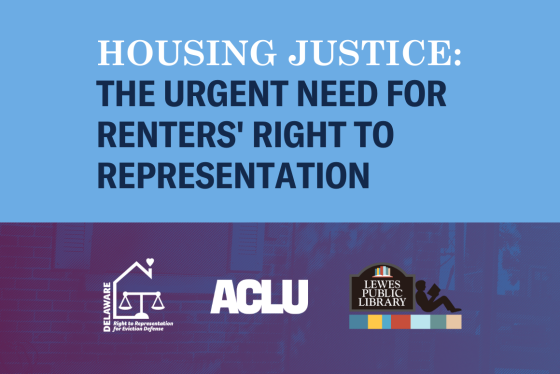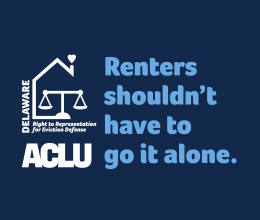DOVER, DE — Last week Gov. John Carney introduced his recommended FY 2024 budget in a public livestreamed presentation, which included significant funding to address housing issues. $1.5 million of the housing budget is said to be dedicated to policy initiatives, which explicitly includes “funding to support a tenant’s right to representation in eviction proceedings.”
In the wake of the pandemic, many families who faced financial devastation due to loss of work and loss of loved ones to COVID-19 have since been served eviction notices. In Delaware, 86% of landlords have legal representation in court eviction proceedings, but only 2% of renters have representation. Without legal assistance to help navigate the court system, many renters are unable to maintain their housing or settle financial disputes in fair and equitable ways.
The Community Legal Aid Society, Inc. (CLASI), which provides free legal services to vulnerable Delawareans, has seen an increase in individuals struggling to navigate these eviction proceedings.
“I was scared to death,” says a Dover resident who was served with eviction papers last year, despite being current on her rent. “We’d lived in our home for eight years and all of a sudden they said we had to be out.” The mother of three did not have any legal representation to contest the eviction order and couldn’t find another place to live at the time. She was forced to put her family’s belongings into storage and leave the community. “It’s very traumatic, especially when you have kids.”
In a recent public briefing and letter to the 152nd General Assembly, the ACLU of Delaware named the Right to Representation as one of its key legislative priorities for 2023, continuing efforts from prior years. “The ACLU of Delaware is grateful to Governor Carney for prioritizing renters’ right to representation in evictions,” stated the executive director Mike Brickner. “As families in the First State grapple with obtaining and sustaining affordable housing, access to representation in evictions is a critical tool to keep more people housed.”
Of the $101.5 million budgeted for overall housing investment, Gov. Carney’s staff stated, “The $1.5 million is dedicated to policy initiatives that the administration is in full support of,” acknowledging the effort of Senator Bryan Townsend and others in spearheading right to representation legislation.
Earlier this month, Senate Bill 1 was introduced by Sen. Townsend with additional sponsorship from Sen. Hoffner, Sen. Pinkney, Rep. Minor-Brown, and Rep. Lambert. This proposed bill would guarantee a right to representation for low-income renters facing eviction whose household income is lower than 200% of federal poverty guidelines. It would also require landlords to provide notice of the right to representation at certain stages of a tenancy and in eviction proceedings.
SB 1 is a modification of SB 101, which was introduced in 2021. While the original bill passed the Senate that year, it was defeated by a House vote of 16-23 in 2022.
SB 1 includes some key changes to the original legislation:
- Renters have a right to representation when they receive notice that they must vacate their unit, as well as when they receive notice that rent is past due, they have violated their lease, an eviction proceeding is initiated, or when their subsidy is terminated.
- Small landlords are now exempt from the program’s requirements if they own three or fewer units and are not using a lawyer or agent.
- The Justice of the Peace Court will run the Eviction Diversion Program, rather than the Attorney General’s office.
- Delaware Volunteer Legal Services will coordinate the program rather than the Attorney General’s office, as a cost-saving measure.
- Military veterans and active-duty members have been added to the list of groups given priority for representation if there is not sufficient funding for universal representation.
“SB 1 is a crucial antidote to a terrible problem,” says Daniel Atkins, executive director of CLASI. “Delaware has one of the highest eviction filing rates in the country, and too many people are suffering because of it. By providing low-income renters with access to representation, exempting small landlords, and requiring parties to mediate disputes for easier resolutions, it’s a win-win-win for renters, landlords, and the state.”
The Delaware Right to Representation for Eviction Defense campaign is supported by both local and national partners, all of which are in favor of the newly proposed SB 1. This includes ACLU of Delaware, ACLU National, CLASI, the Delaware Coalition Against Domestic Violence, the H.O.M.E.S. Campaign, Housing Alliance Delaware, and the Southern Delaware Alliance for Racial Justice.
Anyone interested in learning more about this campaign and offering support can visit: https://www.aclu-de.org/en/delaware-right-to-representation.
Governor Carney’s FY 2024 budget presentation can be viewed in its entirety here: https://youtu.be/UxCaUQLcYgo?t=2436 (Time-stamped at 40:36 where right to representation is referenced.)
Full details on Senate Bill 1 can be found here: https://legis.delaware.gov/BillDetail?LegislationId=129961


